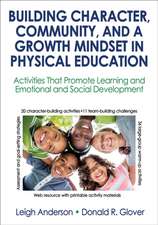Governance of Educational Trajectories in Europe: Pathways, Policy and Practice
Editat de Andreas Walther, Marcelo Parreira do Amaral, Morena Cuconato, Roger Daleen Limba Engleză Paperback – 29 noi 2017
| Toate formatele și edițiile | Preț | Express |
|---|---|---|
| Paperback (1) | 240.23 lei 6-8 săpt. | +90.70 lei 5-11 zile |
| Bloomsbury Publishing – 29 noi 2017 | 240.23 lei 6-8 săpt. | +90.70 lei 5-11 zile |
| Hardback (1) | 776.24 lei 6-8 săpt. | |
| Bloomsbury Publishing – 18 mai 2016 | 776.24 lei 6-8 săpt. |
Preț: 240.23 lei
Preț vechi: 307.03 lei
-22% Nou
Puncte Express: 360
Preț estimativ în valută:
45.98€ • 47.87$ • 38.85£
45.98€ • 47.87$ • 38.85£
Carte tipărită la comandă
Livrare economică 10-24 martie
Livrare express 01-07 februarie pentru 100.69 lei
Preluare comenzi: 021 569.72.76
Specificații
ISBN-13: 9781350053380
ISBN-10: 1350053384
Pagini: 352
Dimensiuni: 231 x 155 x 32 mm
Greutate: 0.49 kg
Ediția:NIPPOD
Editura: Bloomsbury Publishing
Colecția Bloomsbury Academic
Locul publicării:London, United Kingdom
ISBN-10: 1350053384
Pagini: 352
Dimensiuni: 231 x 155 x 32 mm
Greutate: 0.49 kg
Ediția:NIPPOD
Editura: Bloomsbury Publishing
Colecția Bloomsbury Academic
Locul publicării:London, United Kingdom
Caracteristici
Provides innovative insights into how social inequality is constructed and reproduced through overall discourses, institutional regulation, formal and informal support, and individual decision-making
Notă biografică
Andreas Walther is Professor of Social Pedagogy and Youth Welfare and Director of Education and Coping in the Life Course Research Centre at the Goethe University Frankfurt am Main, Germany.Marcelo Parreira do Amaral is Professor of International and Comparative Education at the University of Munster, Germany.Morena Cuconato is Associate Professor for Social Pedagogy at the Department of Educational Studies at the University of Bologna, Italy.Roger Dale is Professor of Education at the University of Bristol, UK, and at the University of Auckland, New Zealand.
Cuprins
List of figuresList of TablesNotes on ContributorsIntroduction: The Reshaping of Educational Trajectories in European Knowledge Societies, Morena Cuconato (University of Bologna, Italy), Roger Dale (University of Bristol, UK), Marcelo do Parreira do Amaral (University of Münster, Germany) and Andreas Walther (University of Frankfurt, Germany)1. Comparative Perspective on the Governance of Education in the Life Course, Andreas Walther (University of Frankfurt, Germany), Marcelo Parreira do Amaral (University of Münster, Germany), Morena Cuconato (University of Bologna, Italy) and Roger Dale (University of Bristol, UK)2. The Diversity of Education and Welfare Systems in Europe, Jenni Tikkanen (University of Turku, Finland), Andy Biggart (Queens University Belfast, UK) and Alex Pohl (IRIS e.V., Germany)Part I: Governance of Education3. Scales, Discourses and Institutions in the Governance of Educational Trajectories in Europe, Roger Dale (University of Bristol, UK), Yuri Kazepov (University of Urbino, Italy), Risto Rinne (University of Turku, Finland) and Susan Robertson (University of Bristol, England)4. Translation of Policy Instruments and Negotiation of Actors in Local School Spaces, Karin Amos (University of Tübingen, Germany), Patricia Loncle (High school of public health, Rennes, France), Alessandro Martelli (University of Bologna, Italy), Eduardo Barberis (University of Urbino, Italy), Valérie Becquet (University of Cergy-Pontoise, France) and Ulrich Theobald (University of Tübingen, Germany)Part II: Access to Education 5. Understanding the Interactive Emergence of Educational Inequalities through Access and Accessibility of Education, Barbara Stauber (University of Tübingen, Germany), Marcelo Parreira do Amaral (University of Münster, Germany) and Isabelle Danic (University of Rennes, France)6. Producing Accessibility through Discretionary Practices of Educational Professionals, Eduardo Barberis (University of Urbino, Italy), Izabela Buchowicz (Warsaw School of Economics, Poland) and Nicola De Luigi (University of Bologna, Italy)Part III: Coping with Educational Demands7. Educational and Vocational Guidance as Support Mechanisms in Schools, Joanna Felczak (Warsaw School of Economics, Poland) and Ilse Julkunnen (University of Helsinki, Finland)8. Cooperation and Problems of Recognition between Schools and Parents in Supporting Young Peoples' Educational Trajectories, Hulya Kosar Altinyelken (University of Amsterdam, The Netherlands), Silvia Demozzi (University of Bologna, Italy), Felicitas Boron (University of Tübingen, Germany) and Federica Taddia (University of Bologna, Italy)Part IV: Relevance of Education9. Comparing the Views of Students, Parents, and Teachers on the Emerging Notions of Relevance of Education, Joanne McDowell (University of Hertfordshire, UK), Andreja Zivoder (University of Ljubljana, Slovenia) and Alessandro Tolomelli ( University of Bologna, Italy)10. The Relevance of Informal Learning and Out-of-school Contexts for Formal Educational Transitions, Veronica Salovaara (University of Helsinki, Finland) and John Litau (University of Frankfurt, Germany)Part V: Educational Transitions in the Life Course11. Students' Decision-Making Strategies at Transitions in Education, Morena Cuconato (University of Bologna, Italy), Karolina Majdzinska (Warsaw School of Economics, Poland), Andreas Walther (University of Frankfurt, Germany) and Annegret Warth (University of Frankfurt, Germany)12. Teachers and Parents as Actors in the Students' Educational Transitions, Mirjana Ule (University of Ljubljana, Slovenia), Andreja Zivoder (University of Ljubljana, Slovenia), Harry Lunabba (University of Helsinki, Finland) and Manuela du Bois-Reymond (University of Amsterdam, The Netherlands)Conclusion: Comparative Multilevel Analysis of Educational Trajectories, Andreas Walther (University of Frankfurt, Germany) and Marcelo Parreira do Amaral (University of Münster, Germany)Notes ReferencesIndex
Recenzii
I welcome this ambitious book which represents a genuinely original approach to comparative analysis. I was particularly impressed with its attempt to grasp the complexity of what is happening to young people in eight European countries with strikingly different histories. The finding which stood out for me is the enormous pressure that an increasingly instrumental approach to policy puts on young people, especially those from disadvantaged backgrounds. The book's attempt to relate changes in governance to the educational decision-making of young people is well captured in the three case studies and their analysis. Life histories have much to offer in fleshing out abstract policy ideas such as lifelong learning.
This is a thoughtful and thought-provoking collection of papers that sets out to trouble common-sense assumptions underpinning much of the master discourse around competitivity, lifelong learning, and the learning society. It does so in ways that are theoretically informed, with a firm grounding in empirical data from eight European countries. By giving importance to the specificity of the local, while carefully reflecting on the way this interacts in complex and multifarious ways with the transnational, this volume generates an impressive range of insights that help us better understand how the trajectories of young people from disadvantaged backgrounds are the result of complex interactions between societal structures and individual subjective action. Such engagement with both lifecourse and governance perspectives help bring back the political, contesting the insidious processes of responsibilisation that the hegemonic discourses around 'employability' promote. With its rigorous approach to generating rich data and nuanced interpretation of the challenges young people face in navigating life, this is an example of collaborative European research at its very best.
This is a thoughtful and thought-provoking collection of papers that sets out to trouble common-sense assumptions underpinning much of the master discourse around competitivity, lifelong learning, and the learning society. It does so in ways that are theoretically informed, with a firm grounding in empirical data from eight European countries. By giving importance to the specificity of the local, while carefully reflecting on the way this interacts in complex and multifarious ways with the transnational, this volume generates an impressive range of insights that help us better understand how the trajectories of young people from disadvantaged backgrounds are the result of complex interactions between societal structures and individual subjective action. Such engagement with both lifecourse and governance perspectives help bring back the political, contesting the insidious processes of responsibilisation that the hegemonic discourses around 'employability' promote. With its rigorous approach to generating rich data and nuanced interpretation of the challenges young people face in navigating life, this is an example of collaborative European research at its very best.











